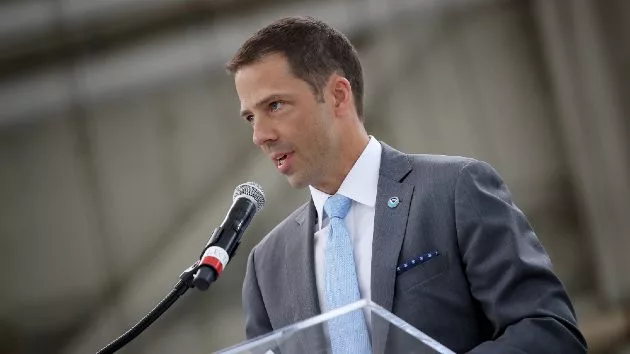
(WASHINGTON) — Neil Jacobs, the atmospheric scientist nominated by President Donald Trump to lead the National Oceanic and Atmospheric Administration (NOAA), has vowed to place science, human safety and technological innovation at the forefront of operations if confirmed as the agency’s administrator.
On Wednesday, U.S. senators interviewed Jacobs on how he would run NOAA, the federal agency that manages the National Weather Service, the nation’s primary source for weather forecasts and data, and is responsible for monitoring and managing coastal and marine resources.
“NOAA has an important, unique mission that spans the sea floor to the Sun’s surface,” Jacobs said. “Not only do they conduct cutting-edge coastal and ocean research, but they also provide life-saving forecast predictions in a wide range of environmental phenomena.”
Jacobs said he has a “very detailed understanding” of what is needed to manage NOAA, from the policy, budget and personnel sides as well as opportunities for innovative solutions.
“If confirmed, it would be a tremendous honor to lead such a distinguished organization,” Jacobs said. “I can assure the committee that I will do my best to ensure this team of scientists, engineers, forecasters and uniformed officers have the resources and leadership needed to fulfill their mission of science, service and stewardship.”
Taylor Jordan, the nominee for assistant secretary of commerce for environmental observation and prediction, and Harris Kumar, nominee for assistant secretary of commerce for legislative and intergovernmental affairs, also appeared in the confirmation hearing,
If confirmed, Jacobs would lead NOAA during a tumultuous time at the agency.
Since his nomination in February, NOAA and the NWS have lost hundreds of staffers, research funding and experienced weather data collection disruptions due to cuts by the Department of Government Efficiency (DOGE)
“I support the president’s budget,” Jacobs said, when asked whether he supports cuts throughout the agency.
If confirmed, this would be Jacobs’ second stint leading NOAA. He served as acting administrator from 2019 until Trump left office at the end of his term in January 2021.
He is remembered for the so-called “Sharpiegate” incident that took place during a press briefing from the Oval Office in September 2019. A map of the storm track of Hurricane Dorian appeared to have been altered with a black pen to include southern Alabama, even though the official storm track by the NWS did not have the storm hitting the state.
Trump had also inaccurately declared a few days earlier that the storm would strike the region. Shortly after, NOAA issued a statement that sided with Trump and admonished the NWS for publicly saying that Alabama was not in danger from the storm.
Dorian ultimately stayed east of Florida and did not make landfall in the U.S.
The NOAA Science Council subsequently investigated Jacobs, saying that he violated the organization’s scientific integrity policy by issuing a statement supporting Trump’s incorrect claim about Dorian’s storm track as an official NOAA release.
When asked by Sen. Ben Ray Luján, D-NM, on Wednesday whether he would “make the same decision again,” Jacobs replied, “There’s probably some things I would do differently.”
At the time of his nomination, Jacobs was the chief science adviser for the community Unified Forecast System (UFS), part of the University Corporation for Atmospheric Research’s (UCAR) Cooperative Programs for the Advancement of Earth System Science at North Carolina State University.
Before serving as NOAA’s acting director, Jacobs was the chief atmospheric scientist at Panasonic Avionics Corporation, where he directed the research and development of its aviation weather observing platforms and modeling programs.
Jacobs was recognized as a 2025 Fellow of the American Meteorological Society earlier this year and holds a bachelor’s degree in mathematics and physics from the University of South Carolina and master’s and doctoral degrees in atmospheric science from North Carolina State University.
In a podcast interview in November 2024, Jacobs shared his views on the future of government agencies, like NOAA, and efforts by the GOP to repeal and eliminate various weather and climate initiatives within the agency.
“The executive branch can’t just come in and completely change something that’s authorized in law,” he said.
Jacobs also said that “NOAA has all of these congressional mandates that are codified. Congress would have to rewrite a mountain of legislation to undo all that.”
ABC News’ Matthew Glasser, Daniel Manzo and Daniel Peck contributed to this report.
Copyright © 2025, ABC Audio. All rights reserved.








